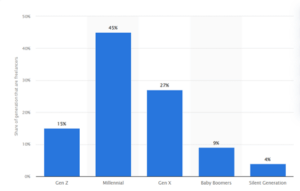Healthcare staffing is in the middle of a generational shift, driven by changing workforce demographics and evolving employee priorities. A 2023 Statista survey revealed that Millennials make up 45% of gig workers, while Gen Z accounts for 15%, Gen X 27%, and Baby Boomers 9%.
Millennials, the largest workforce demographic, are driving more demand for flexible work arrangements. Meanwhile, Gen X and Gen Z professionals are also increasingly seeking flexibility to balance career and personal responsibilities.

The Growing Demand for Flexibility
Flexible staffing models—ranging from PRN shifts to gig-style contracts—resonate with today’s workforce because they provide autonomy. Millennials and Gen Z prioritize work-life balance, valuing roles that empower them to choose when and where they work. Gen X prefers flexible work arrangements that help manage caregiving responsibilities and stave off financial insecurity. For retired healthcare professionals, flexible options present an opportunity to return to work without the pressures of full-time commitments. In fact, 45% of retired nurses surveyed by the McKinsey Health Institute said they would consider returning to clinical nursing if offered flexible schedules.
The benefits? By tapping into broader talent pools, healthcare facilities can address critical staffing shortages while mitigating burnout and high turnover among existing staff. Beyond filling immediate gaps, flexible staffing solutions offer measurable advantages that support long-term success:
- Cutting Costs: Flexible staffing often leads to long-term savings, reducing reliance on external agencies.
- Optimizing Resources: Flexible staffing models allow facilities to scale their workforce efficiently. Utilizing PRN pools and real-time scheduling tools, organizations can better respond to fluctuating patient needs without the risk of overstaffing or straining resources.
- Attracting Talent: Facilities offering flexibility are more likely to draw applicants across all generations, including retired nurses and allied health professionals who would consider re-entering the workforce on their terms.
- Boosting Retention: Providing flexible options helps combat burnout, improve staff satisfaction, and reduce turnover, creating a more stable workforce.
How to Evolve Your Healthcare Staffing Practices
This preference for flexibility is only growing, reshaping the expectations of healthcare professionals. To meet this demand, healthcare facilities must find ways to evolve their staffing practices to offer the balance clinicians are seeking while maintaining operational efficiency. Here’s how:
- Invest in Scheduling Technology: Modern software enables self-scheduling, shift-swapping, and real-time shift visibility. Tools like Matchwell technology empower clinicians to pick up extra work directly with the organization, making it easier for facilities to access these working professionals who need a little more flexibility.
- Highlight Flexibility in Recruitment: Emphasize flexible options in job postings by using phrases like “customized schedules” or “shift choices” to attract candidates. This targeted language helps your opportunities stand out and gain attention quickly.
- Build or Tap into Resource Pools: Programs like the Indiana Resource Pool connect healthcare facilities with local, qualified clinicians for shifts and contract work. Retirees and part-time professionals often gravitate toward these arrangements, offering experience without long-term obligations. These pools provide a scalable staffing solution while giving clinicians the flexibility they value.
- Understand What Flexibility Means to Your Clinicians: Regular surveys and open communication with your clinicians can uncover what matters most to them, helping refine scheduling practices to better align with their needs and foster a supportive culture.
Looking Ahead
Clinician demand for flexibility is transforming the way healthcare facilities and systems approach staffing. Moving forward, facilities should think beyond traditional staffing models and embrace innovations that align workforce needs with organizational goals.
By adopting agile strategies like PRN pools, collaborative scheduling tools, and resource pool programs, healthcare facilities can build a future-ready workforce. Matchwell, a Medical Solutions brand, is at the forefront of this evolution—partnering with facilities to provide tools and solutions that support both clinician flexibility and operational success.

